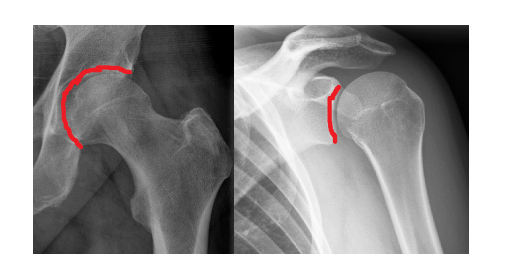By: Geraldus Sigap
Frozen shoulder, also known as adhesive capsulitis, is a condition that affects the shoulder joint, leading to pain and stiffness. As the condition progresses, the shoulder becomes harder to move, sometimes limiting daily activities. Understanding the causes, recognizing the symptoms, and learning about treatment options are essential for finding relief. Fortunately, modern medicine offers effective ways to manage frozen shoulder, and with the right care, patients can regain mobility and reduce discomfort.
The shoulder joint is surrounded by a capsule of connective tissue that helps keep it stable while allowing for movement. In frozen shoulder, this capsule becomes thickened and inflamed, causing it to tighten around the shoulder joint. Over time, this limits the joint’s ability to move freely, leading to stiffness and pain.

Figure 1. Frozen Shoulder
Frozen shoulder typically develops in three stages:
- Freezing Stage: In the initial phase, patients begin to experience pain in their shoulder. This pain can worsen at night and may gradually increase over time. As the pain intensifies, shoulder movement becomes limited. This stage can last anywhere from six weeks to nine months.
- Frozen Stage: During this phase, the pain may begin to subside, but stiffness remains. Movement becomes extremely limited, and tasks such as reaching overhead, dressing, or even lifting objects become difficult. This stage can last for four to six months.
- Thawing Stage: In the final stage, the shoulder’s range of motion slowly starts to improve. Over time, the joint loosens, and normal activity can be gradually resumed. This stage can last between six months to two years, depending on the severity of the condition.
If you suspect that you may have frozen shoulder, it is important to consult a healthcare provider for a proper diagnosis. A physician will typically begin by reviewing your medical history and discussing any recent injuries, surgeries, or other health conditions. They will then perform a physical examination to assess your range of motion and identify any areas of pain or stiffness.
In some cases, imaging tests such as X-rays or MRI scans may be used to rule out other causes of shoulder pain, such as arthritis or a rotator cuff tear. Once frozen shoulder is diagnosed, your doctor will work with you to develop a treatment plan tailored to your specific needs.

Figure 2. Frozen shoulder X-rays
Treatment for frozen shoulder aims to reduce pain, improve mobility, and restore function. The good news is that most people with frozen shoulder can recover with non-surgical treatments. Here are some of the most effective approaches:
- Physical Therapy: Physical therapy is one of the most important aspects of frozen shoulder treatment. A physical therapist will guide you through exercises designed to stretch and strengthen the muscles around your shoulder joint. Regular stretching exercises can help gradually improve your range of motion. However, it is important to note that recovery takes time, and patience is key.
- Medications: Over-the-counter pain relievers such as ibuprofen or acetaminophen can help manage pain and reduce inflammation. In some cases, your doctor may recommend corticosteroid injections to relieve severe pain and inflammation. These injections are administered directly into the shoulder joint and can provide temporary relief, especially in the early stages of frozen shoulder.
- Heat and Cold Therapy: Applying heat or cold packs to the shoulder can help reduce pain and stiffness. Heat therapy helps increase blood flow to the affected area, promoting relaxation and mobility. Cold therapy, on the other hand, can reduce inflammation and numb the pain. Alternating between heat and cold may provide the best results.
- Hydrodilatation: In some cases, a treatment called hydrodilatation may be recommended. This involves injecting a mixture of saline and corticosteroids into the shoulder joint to stretch the capsule and increase mobility. This procedure is usually performed under local anesthesia and can offer relief for some patients.
- Surgery: While surgery is rarely necessary for frozen shoulder, it may be considered for individuals who do not respond to non-surgical treatments. A procedure called shoulder manipulation under anesthesia or arthroscopic capsular release can help loosen the tight joint capsule. These surgeries are minimally invasive and have a relatively quick recovery time.
In addition to medical treatment, there are several steps you can take at home to manage frozen shoulder and support your recovery:
- Stay Active: While it is important to avoid overexerting your shoulder, gentle exercises can help prevent further stiffness. Your physical therapist can recommend specific exercises that are safe to perform at home.
- Maintain Good Posture: Poor posture can contribute to shoulder pain and stiffness. Pay attention to your posture when sitting, standing, or using a computer, and avoid slouching.
- Use a Support Pillow: Sleeping on your back with a support pillow under your arm can reduce nighttime discomfort and help you sleep more comfortably.
- Be Patient: Recovery from frozen shoulder takes time, and it is important to remain patient throughout the process. Do not rush your recovery, and follow your treatment plan
At RS Abdi Waluyo, our orthopedic specialists are highly experienced in diagnosing and treating shoulder conditions, including frozen shoulder. With access to the latest medical technology and a patient-centered approach, we are dedicated to helping you regain mobility and reduce pain.
Our team offers a range of treatment options, from non-surgical therapies such as physical therapy and corticosteroid injections to advanced surgical procedures if needed. We work closely with each patient to develop a personalized treatment plan that addresses your specific needs and goals.
Resources
- OCS DTP DPT. The 8 BEST Frozen Shoulder Exercises for Pain Relief [Homepage on the Internet]. PT Time Tim. 2021 [cited 2024 Oct 8];Available from: https://pttimewithtim.com/frozen-shoulder-exercises/
- Adhesive Capsulitis – OrthoPaedia [Homepage on the Internet]. [cited 2024 Oct 8];Available from: https://www.orthopaedia.com/adhesive-capsulitis/
- St Angelo JM, Taqi M, Fabiano SE. Adhesive Capsulitis [Homepage on the Internet]. In: StatPearls. Treasure Island (FL): StatPearls Publishing, 2024 [cited 2024 Oct 8]; Available from: http://www.ncbi.nlm.nih.gov/books/NBK532955/
